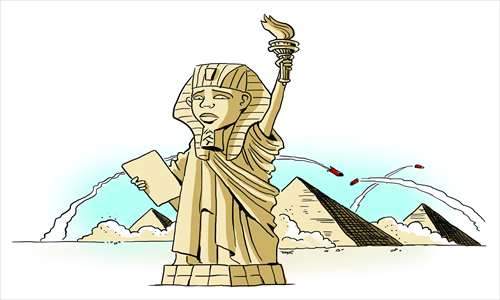Egypt back to square one after euphoria of revolution

On the second anniversary of the Egyptian revolution, it seems that everything is back to where it started.
Exactly two years ago, hundreds of thousands of Egyptian people gathered at Tahrir Square. "We have no food, no education and no future. Mubarak, we have borne you for so long. The people demand the end of the regime," they shouted. Mubarak resisted for 18 days before announcing his resignation and handing power to the army.
Many changes have taken place in Egypt since then, but the real change is in the Egyptian people's low expectations.
After the Egyptian presidential election in June 2012, the political transition roadmap drawn up by the Egyptian army was completed.
But after that, the elected parliament was dissolved by Egypt's High Constitutional Court, which held that the makeup of the entire chamber was illegal. Egypt will hold new parliamentary elections this April.
Newly elected President Muhammad Morsi has also seen an end to his honeymoon period, and is facing tremendous doubts from liberal-secularists. More and more people now believe that he has done nothing positive in his new post.
The new constitution, drafted by the Islamist-dominated constitution assembly and leaning to Islamists' interests, has been met with strong resistance. Although it has been approved in a referendum, the turnout was only 33 percent, and in Cairo, the majority voted no.
The Mubarak case is also back to square one, after he was granted a retrial. State-run newspaper Al-Ahram Weekly even predicted that Mubarak would be acquitted.
I have spoken to many members of Egypt's middle class recently, who told me that they felt pity for Mubarak's situation now. His mistakes were overstated before, and from their point of view, they had better lives in the Mubarak era than they do now. They are extremely confused as to why their country is in such a tight spot at the moment.
Economic difficulties were the main factor prompting Egyptian people to take to the streets and overthrow the regime. However, after two years' turmoil, Egypt's economy is now on the brink of collapse.
The Egyptian pound's devaluation has accelerated, devaluing nearly 8 percent in only two weeks. The GDP's growth rate in 2011 was only 1.8 percent, compared to 5 percent in previous years.
Tourism, one of the four pillars of Egypt's economy, has suffered extraordinary damage in the last two years, with income from the industry in 2011 dropping 30 percent.
Two years after the revolution, none of the demands of the Egyptian people, including higher pay, more job opportunities, a more just society and better social security system, has been achieved.
On the contrary, the revolution has led to the rise of the Islamists. The Muslim Brotherhood was an underground organization during Mubarak's rule, but has now become a predominant political force, winning the parliamentary election, presidential election and constitutional referendum.
Liberal-secularists have accused the Muslim Brotherhood of stealing the fruits of the revolution, but given this organization's strong approval rate among poor people, they can do nothing.
When people talk about the current frustrating situation, the only thing that makes them proud is the fact that they now have democracy. They used their ballots to choose their president last June for the first time in history, and can criticize Morsi in public.
But this unique achievement is beginning to vanish. The Muslim Brotherhood has begun to buy Egypt's main media, and anti-Brotherhood remarks have seen a marked reduction.
The Egyptian revolution was paid for by huge economic losses and continuous internal friction. After the turmoil, many Egyptian people say they need a more stable situation to develop the economy, not continuing demonstrations.
But Egypt's politics is far from mature. Secularists do not want Islamists dominating political life. As long as the party system and democratic rule in Egypt are not strengthened, protests will happen again and again.
People are also becoming increasingly doubtful about the Muslim Brotherhood's ability to develop the economy. But in the face of this continuous volatile situation, who can save the Egyptian economy?
The author is a reporter with People's Daily who is currently stationed in Egypt. opinion@globaltimes.com.cn